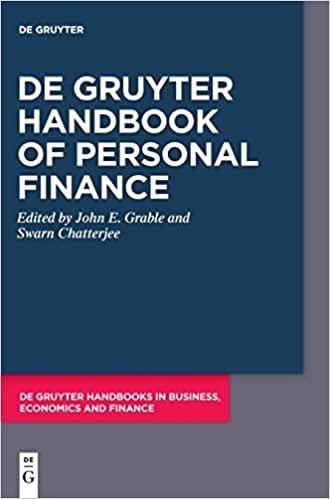Question
1. Saunders Industrial Waste Management (SIWM) publicly indicates to analysts that it is comfortable with the somewhat disappointing earnings per share projection of US$1.16 for
1.
Saunders Industrial Waste Management (SIWM) publicly indicates to analysts that it is comfortable with the somewhat disappointing earnings per share projection of US$1.16 for the quarter.
Bernard Roberts, an analyst at Coffey Investments, is confident that SIWM management has understated the forecasted earnings so that the real announcement will cause an upside surprise and boost the price of SIWM stock. The whisper number (rumored) estimate based on extensive research and discussed among knowledgeable analysts is higher than US$1.16. Roberts repeats the US$1.16 figure in his research report to all Coffey clients but informally tells his large clients that he expects the earnings per share to be higher, making SIWM a good buy.
Which of the following is true?
Roberts failed to treat all clients fairly by passing on speculation about the upside earnings surprise
Roberts failed to treat all clients fairly by not sharing his opinion with all clients
Roberts behaved unethically by undermining Saunders Industrial Waste Managements strategy
Roberts behaved correctly by providing additional service to his best clients
2.
Amanda Janney is employed as a fixed-income portfolio manager for a large international firm.
She is on a team within her firm that is responsible for creating and managing a fixed-income hedge fund to be sold throughout the firms distribution centers to high-net-worth clients. Her firm receives expressions of interest from potential clients from the Middle East who are seeking investments that comply with Islamic law.
The marketing and promotional materials for the fixed-income hedge fund do not specify whether or not the fund is a suitable investment for an investor seeking compliance with Islamic law. Because the fund is being distributed globally, Janney is concerned about the reputation of the fund and the firm and believes disclosure of whether or not the fund complies with Islamic law could help minimize potential mistakes with placing this investment.
Which of the following is correct?
Islamic law is not compatible with fixed-income hedge-funds and therefore she should clearly advise the clients not to invest in the fund
Caveat emptor the client is responsible for screening the investment
Any funds sold to Islamic investors should be sold through an intermediary well-versed in Islamic law and customs
She should research whether or not her fund is compatible with Islamic law and ensure that this is clearly stated and clients are advised
3.
Wrigglesworth and Hardy is a small investment firm specialising in securities.
A new product comes onto the market which is particularly complex. Tom Aitken comes to work feeling under the weather and cannot understand the product. His junior colleague assures him that the product is an interesting prospect and one that the firm should advise clients to invest in.
What should Aitken do?
Aitken should not advise clients to invest in the product until he can understand it himself
Aitken should advise clients to invest
Aitken should ask his junior colleague to make the recommendation on his behalf
Aitken should recommend to his firm that the product is not recommended because of its complexity
Step by Step Solution
There are 3 Steps involved in it
Step: 1

Get Instant Access to Expert-Tailored Solutions
See step-by-step solutions with expert insights and AI powered tools for academic success
Step: 2

Step: 3

Ace Your Homework with AI
Get the answers you need in no time with our AI-driven, step-by-step assistance
Get Started


